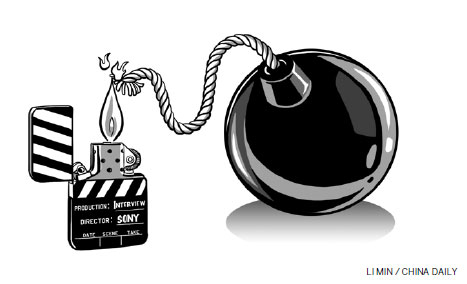Wrong film on DPRK at the wrong time
The Democratic People's Republic of Korea has denied that it is responsible for the crippling cyberattack on Sony Pictures Entertainment which made available unreleased Sony movies on illegal file-sharing websites and resulted in the leak of sensitive personal information on about 47,000 individuals. But many still believe Pyongyang orchestrated the attack in an apparent retort to the Sony movie, The Interview, which revolves around an attempt on the life of DPRK leader Kim Jong-un and is expected to hit the screens in North America later this month.
An unidentified spokesman for the DPRK's National Defense Commission has been quoted by news agencies in Seoul as saying that the cyberattack "might be a righteous deed by the supporters and sympathizers" of Pyongyang.
In June, the DPRK denounced the film, saying it was insult to the country's supreme leadership. Indeed, the film shows little respect to the DPRK. With a comedic plot to assassinate the DPRK leader and the use of his real name, The Interview challenges Kim's leadership, which has been accepted by people of the DPRK as a whole.
The film's producers and the Motion Picture Association of America, which devises the production code for American movies, are aware of The Interview's theme, yet both seem to have turned a blind eye to its controversial content. Their selective "ignorance" is representative of how US society views the DPRK.
Washington did hope to establish diplomatic contact with Pyongyang when Kim assumed office three years ago. In a bilateral agreement reached on Feb 29, 2012, the United States promised to provide food assistance to the DPRK if it allowed International Atomic Energy Agency inspectors to return to the country. But Kim's pursuit of political brinkmanship, including the third nuclear test in 2013, thwarted this initiative and gave Washington the impression that he was a rash and insincere young leader.
Admittedly, Kim's foreign policy, including making more nuclear threats, is far from flawless. The international community, including China, has already imposed sanctions on the DPRK for its wrongdoings. But one of the unspoken diplomatic rules of bilateral relationships is that no group or country should demonize a country's leader like The Interview does.
Like many new political leaders across the world, Kim is still learning how to fulfill his responsibilities toward his country, which have become even more difficult because of the DPRK's continuing isolation from the rest of the world and sluggish economy. Kim has been working hard to portray the DPRK as a more open and confident country. Sending Choe Ryong-hae, secretary to the Central Committee of the ruling Workers' Party of Korea, as special envoy to Russia in November is one example of his efforts.
More importantly, Pyongyang is ready for the restart of the Six-Party Talks without any pre-condition, Russian Foreign Minister Sergei Lavrov said after meeting with Choe on Nov 20. And the Six-Party Talks is the only platform that can help resolve the Korean Peninsula nuclear issue.
In the background of such positive developments, the stereotype presented by the Sony film sticks out like a sore thumb. Instead of helping restore peace on the Peninsula, it will only widen the rift between Pyongyang and Washington. Worse, it could force the DPRK leader to withdraw from his commitments. And an angry DPRK will not be in the interest of any country.
The need, therefore, is to maintain the necessary pressure on the DPRK to keep it on the track to denuclearization. The Interview is contrary to this need.
Although American movies are known for their commercial features, they should be sensitive to political concerns. A couple of important questions have to be answered before The Interview is released: Is this really a good time to screen this movie? If it is, could Kim's name be replaced by any other name and could the action be shifted from the DPRK to some fictitious place? Let us not forget, proper diplomatic moves are required to keep Washington-Pyongyang ties and the Korean Peninsula situation from worsening.
The author is an associate professor at the National Institute of International Strategy, Chinese Academy of Social Sciences.



















